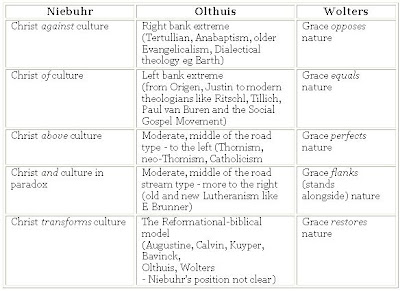One of the largest problems facing Christians who want to develop and embrace a biblical worldview is dualism. Dualism is the tendency to split life into two levels: a higher and a lower sphere. Examples might be sacred and profane, spiritual and secular or grace and nature.
Van der Walt aptly describes it:
The basic mistake of early Christianity - which plagued Christianity throughout its subsequent history - can also be explained by saying that Christians ascribed a ontological (or structural) character to the religious (or directional) antithesis between obedience and disobedience to God: one part of the creation (the sacred) was regarded to be good by nature, while the other considered to be of less importance or even evil by nature (p 7).
He traces this tendency throughout the history of Christian thought from its pagan origins through its Christianisation in patristic and medieval thought. He also discerns aspects of dualism in Calvin and Abraham Kuyper (following Zuidema). In De Gemeene Gartie Kuyper distinguishes between common and particular grace; particular grace strengthens and enhance common grace - a grace perfecting nature position; whereas in Pro Rege he seems to have broken from this dualism and 'we are in the service of Christ throughout the entire domain of common grace' (p. 15).Turning next to the tendencies in African Christianity he briefly looks at Kwame Bediako's analysis and the similarities between African theologians and the early church theologians. He finds Bedakio's approach, among other things, lacks an understanding of the 'dangerous ontological dualism inherent in the theologies of early christians' (p. 18). One major tragedy he identifies within Africa Christianity is its escapist tendency, this he believes is a consequent of the truncated and domesticated message of the missionaries. Among their many characteristics are pietism, individualism, an emphasis on personal holiness only, the spiritualising of the kingdom of God and the reluctance to be involved in politics. Together with an escapist mentality comes an increasing secularisation.
Van der Walt's vision for South Africa, which he has spelled out in a number of other books, is that it will be liberated from the shackles of dualism and includes 'an interal, radical (socially) involved and kingdom Christianity' (p. 23).
He now moves on to look at typology of five dualisms and to give a biblical critique of them. As I have mentioned bfore any mention of Christianity and culture will almost certainly invoke Niebhur - and this chapter is no different. He compares Niebhur's approach with James Olthuis's and Al Wolters's. This is neatly summarised in a table:
He then looks at how these positions might view politics and how they might respond to the question 'Should I go to a rock concert?'. The responses might be:
1. Stay away - it is from the devil!
2. If it is a good performance no problem - go for it.
3. You may attend - but remember before and after to confess your sin.
4. Please go - but I want to see you in church on Sunday.
5. Be careful! First ask yourself whether it will be possible to serve God - not before or after the event, but in your attendance.
He then examines these two-realm dualisms from a biblical perspective. He warns us to be on the look out for unbiblical terminology that may reveal a dualistic tendency. These include nature/ grace; nature/ supernature; secular/ religious; natural (general) revelation/ supernatural (special) revelation; profane/ secular; and so on.
Along the way he looks at the misconception of equating the church with the kingdom: 'the church reveals the kingdom but it is only one expression' (p. 34). He makes a distinction between religion and faith: faith is one of the modes of being religious, religion is not an addition but the essence of life.He makes an excellent point about two-realm theories: they arise from different viewpoints as to the place in creation that sin is located, how serious the effects of sin are and how great or little the need for redemption will be (p. 36). He also draws out the different meaning of dualism in Dooyeweerd and Vollenhoven. For Dooyeweerd dualism is primarily of a religious-worldviewish nature; the antithesis is given an ontological status. In Vollenhoven, dualism is used in the sense of being the opposite of monism: monists have to explain the variety in creation, whereas dualists have to explain the unity of reality.
He concludes by offering a brief description of a reformational worldview. It is free from dualism(s), it is integral and holistic.


No comments:
Post a Comment